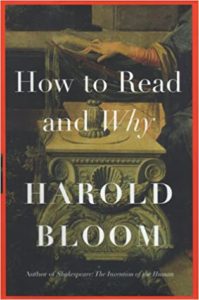How to Read and Why, Harold Bloom 2000
Harold Blom who is often referred to as the most influential literary critic of the 20th C. died in October, 2019 at the age of 89. I originally read this book in 2000, and it was an important influence in determining my reading over the last two decades. Bloom, who had been the Sterling Professor at Yale, was a classical literary scholar, valuing Shakespeare among all other writers and defending the Western canon against feminist, ethnic, gender, and other sub-cultures which threatened its primacy. I found two great gifts in this book. First, Bloom provides a list of suggested readings in short stories, poems, novels, and plays and then comments in detail on each one. Referring to his list on many occasions, I’ve now managed to read all the short stories, poems, plays and all the novels except Proust, Cervantes, Stendahl, West, and McCarthy, but I intend to get to them. Perhaps even more important than the list of ‘what to read’, Bloom shares with the reader his love of reading, the value that he places upon it and what he gets from it. It was only on this second reading of his book that I focused on Bloom’s two primary benefits of reading: the development of the self and the enriching of the overhearing, the conversation between me and myself that enables me to fully develop as a person. Bloom writes: “Solitude is the more frequent mark of our condition; how shall we people that solitude? Poems can help us to speak to ourselves more clearly and more fully, and to overhear that speaking….We speak to an otherness in ourselves, or to what may be the best and oldest in ourselves. We read to find ourselves, more fully and more strange than otherwise we could hope to find.” To enlarge reality, to expand solitude, to cultivate our individual consciousness, to cure the dark despair that accompanies our knowledge of inevitable impermanence, to clear our mind of cant, to acquire knowledge, to search for a difficult pleasure—-these are the reasons to read that Bloom proffers and then provides the specific works by which one can best accomplish those goals. This is a very special book and merits re-reading more often than every 20 years.



